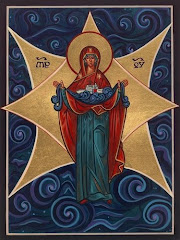The Gospel reading for today, for the Second Sunday of Lent, is of the Transfiguration of Christ, where Christ shone in glory to Peter, James, and John, and His Sonship to God the Father was once again revealed. I love the Transfiguration. My favorite line of the reading is the words of Peter, realizing the beauty and glory of that moment, and saying, "It is good that we are here." I find myself saying that so often in my life. In those moments when you feel so fulfilled, so at peace, so content with what God has given you; how can you not just look around, breathe it all in, and say, "it is good that we are here."
Tonight, though, for the first time, I noticed some new words.
Peter and his companions
had been overcome by sleep;
but becoming fully awake,
they saw His glory.
(Luke 9:32)
Peter and his companions were asleep--definitely a recurring problem for them--falling asleep as Jesus kept His long prayer vigils. At this point, as Christ was praying, Moses and Elijah appeared and were conversing with Christ before Peter, James, and John even woke up! Look at what they were missing! Look at what was happening before them--but--they were asleep. Missing out on the glory before them.
And yet, suddenly, they were awakened. And Scripture doesn't just say "they woke up," but rather, that they became "fully awake." What does that mean? What's the difference between being "awake" and being "fully awake?" If they had just been "awake," they would have woken up, freaked out at the bright light and strange people around them, and we would have heard a much different Gospel today. Instead, they were "fully awake"--and they immediately saw the glory of the Lord before them, recognized Moses and Elijah before them, and immediately saw the Truth, Beauty of Goodness of the Transfiguration. Peter made that beautiful statement, "it is good that we are here," and even offered to build tents, that they might stay there and allow this unbelievable moment to endure. They were fully awake because their hearts were attentive to God and hopeful for what He could do in their lives--and hence, the Transfiguration was not a moment of fright, but a moment of sheer beauty.
So what are we doing? Are we living our lives asleep, blind to what is going on around us, unaware of what God is doing in our lives? Are we not asleep but just simply awake, able to see what God is doing but not able to comprehend it or accept it? Or, are we living our lives fully awake, aware of His grace and His goodness, thriving so beautifully in His will that we cannot help but exclaim at every moment of our lives, "it is good that we are here."
Wake up!



